模块4知识点unit 1
英语外研九年级上册Module 4 Home alone[第四模块unit 1]
![英语外研九年级上册Module 4 Home alone[第四模块unit 1]](https://img.taocdn.com/s3/m/cb8fff50f342336c1eb91a37f111f18583d00c9a.png)
Homework
1. Read the dialogue after the tape. 2. Remember the new words, expressions
and important sentences. 3. Try to write down the report.
Lhasa!” This means you do not know where we are staying / what we are doing.
2.You see passengers travelling by train / staying at home.
3. When your clock rings, it is quiet / makes a loud nois词e汇. 运用。在语境中巩固词汇。
7. At a meeting, you meet people for work / fun.
Read and find them and then guess the meanings.
● Now, ... ● I’m sorry … ● So am I. ● Have a good trip!
(1) Betty’s mum tells her to * be _c_a_re_f_u_l__ with the door. * eat plenty of _fr_e_s_h__fr_u_i_t_a_n_d__v_e_g_et_a_b_l_e_s. * shut the door when she is __in___. * lock the door when she goes _o_u_t_.
课重点知识。挖掘对话中的隐含信息,引导
译林牛津版高中英语模块4 Unit 1 单词学习一
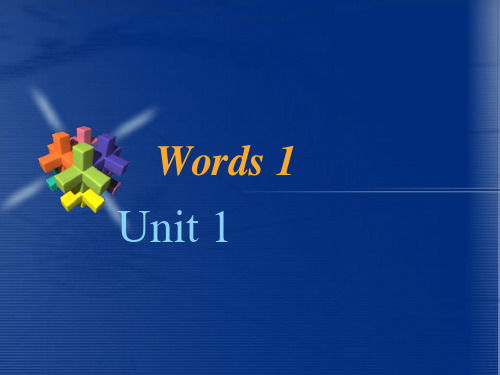
• • • • • • • •
persuade v. persuade sb ( into sth/ into doing sth) persuade sb to do persuade sb (out of sth/ out of doing sth) persuade sb not to do persuade sb that... She is always easily persuaded. I am still not fully persuaded of the plan’s merits.
Words 1
Unittise vt. & vi. advertise a product/ a business advertising n. 做广告, 广告活动;广告业 advertisement n.
• • • • •
shine n.光亮; 光泽: 磨, 擦 put a good shine on boots Rain or shine, we'll set out tomorrow. vt. (shone, shone) shine one's shoes vi. • Her eyes shone with excitement.
• • • • • • • • •
comment n.评论, 意见, 解释, 批评 Comment is needless. make comments on sth. 评论某事 No comment . 无可奉告。 without comment 不必多说 vt. & vi.评论; 谈论 注释; 批评(on, upon) comment on an article 评论文章
• trick
• • • • • n.戏法, 把戏 An old dog cannot learn new tricks. 少壮不努力,老大徒伤悲。 计谋, 诡计 Don't be fooled by any of her cunning tricks. 诀窍, 技巧 Patience is the trick in doing a job well. play a trick/tricks on sb=play jokes on 开某人玩笑,捉 弄某人 • vt.哄骗; 欺骗 Don't try to trick me! • trick sb into doing 用计诱使某人做某事 • trick sb out of sth 骗走某人---东西
外研版五年级英语下册模块4Unit1

A、send
B、sent
C、sending
谢谢
Lingling: They’re dictionaries. We can put them here. 它们是字典。我们可以吧它们放在这里。
Amy: These are the library cards for our friends. 这些是给我们的朋友们的借书证。
Lingling: Great! Now we can ask them to come.
太棒了!现在我们能邀请他们来了。
③Amy:Let’s make a home library.
让我们建一个家庭图书馆。
Lingling: That’s a good idea. 那是一个好主意。
Lingling: These are all books about science. 这些都是关于科学的书。
B、to
C、about
( B)2、They are Shelf C.
A、of
B、on
C、at
( B)3、Here your book.
A、are
B、is
C、any
( C)4、Where I find books about science?
A、amBຫໍສະໝຸດ isC、can( B)5、Mr Chen these books to us .
Lingling: Let’s put them on this shelf. 让我们把它们放在这个架子上。
提建议的句型 Let’s +动词原形 + 其他。“让我们……”
例如:Let’s go to school.
选择填空。
( C)1、Where are the books
四年级上学期英语第四模块知识点

Module 4 Unit 1中国古代四大发明:1.造纸术:paper2.印刷术:printing3.火药:gunpowder4.指南针:compass重点单词、短语和句子:1.invent v.发明invention n.发明2. print v.打印printing n.印刷术3.clever 聪明的4.like 喜欢,像…5.That’s right.那是正确的。
/That’s all right.没关系。
6. important things 重要的东西/重要的事情7. read newspapers 看报纸Module 4 Unit 2重点单词、短语和句子:1.look at…看…Look at this picture.看这幅图。
2.bicycle/bike 自行车3.a Chinese 一个中国人4.an English 一个英国人5.in eighteen thirty-nine 在1839年6.in two thousand(千) and eight 在2008年in two thousand(千) and ten 在2010年7.What a good idea! 多么好的注意啊!(感叹句)8.One wheel(轮子、轱辘) of this bicycle was very small.The two wheels of this bicycle were very big.(注意单复数之分。
)9.That’s true. 那是真的。
That isn’t true. 那不是真的。
第四模块的重点句式依然是一般过去时,要牢记这些基础知识。
练习题:用所给单词的正确形式填空。
1. Amy (make) a cake just now.2. English people (invent) paper.3. My father usually (wash)his trousers.4. We (read)a book now.5. She didn’t (print) newspapers last week.6. I will (play)the flute.7. Leo (finish) his homework next week.8. I am going to (are) a teacher.。
牛津高一英语模块四unit1单词讲解 [牛津版]
![牛津高一英语模块四unit1单词讲解 [牛津版]](https://img.taocdn.com/s3/m/440f10ef5ef7ba0d4a733b99.png)
0模块四单词讲解unit 11.advertise v. advertiser登广告者,广告客户advertising广告业,广告advertisement广告,做广告I advertised my car for sale. 我登广告卖车子。
Jobs are advertised in the papers. 在报纸上有招聘广告。
advertise for sth. 登广告寻找He advertised for a secretary/ a job. 他登广告招聘一名秘书/谋求一份工作。
advertisement companymake /put an advertisement in the newspaper 在报纸上登广告2. share (n.)We must do our share for our country. 我们必须为国家做我们的一份贡献。
share price 股价(vt) share the same fate 遭受同样的命运。
share sth. with sb. 与别人共用或合用某物,分派share in 分享,分担share sth. (out) among/between sb. 将某物平均分配,均分shareable 可分摊的,可分享的,可分担的sharer共同收受者,分配者,参与分配或分红者He is really a friend of mine. He would _____ his last penny with me. (D)A. costB. lendC. supportD. share3. promote(promoted promoting)The instructor was promoted to /to be professor. 那位讲师升为教授。
The boss promoted him to the post of chief accountant. 老板提他为会计主任。
模块4Unit1-3各单元重点语言点及单元小练习(译林牛津版高一英语必修四教案教学设计)

模块4 Unit 1-3 各单元重点语言点及单元小练习(译林牛津版高一英语必修四教案教学设计)一、【学习目标】1.学习与广告有关的单词、词组与句型。
2.运用所学词汇读懂与广告有关的文章,并能就此发表观点。
★本单元重要词组:be used to(doing)sth 习惯于(做)某事 encourage sb to do sth 鼓励某人做某事do some research on sth 做…的研究 share sth with sb 与某人分享某物be intended /meant to do sth 旨在做… protect sb from 保护某人不受…的伤害be aware of 意识到 even if 即使fall for 受…的骗 be proud of 以…感到骄傲connect … to… 将…与…连接 play tricks on sb 捉弄某人lead(live) a …life 过着…的生活 deal with 处理be satisfied with 对…感到满意 believe in sth 信仰;信任trick sb into doing sth 诱使某人做某事 go on the market 上市be popular with 受…的欢迎 be of high quality 高质量for the benefit of 为了…的利益 get sb to do sth 使某人做某事come up with 提出 over and over again 反复地in order to 为了,以便 up to 达到be bored with 对…感到厌倦 day and night 整日整夜be concerned with 对…关心;与…有关 put sth together 组织;汇集appeal to sb迎合某人;对…有吸引力;向…呼吁get sth across 传播(消息等);使某事被人理解二、【要点解读】1. be used to (doing) sth对…习以为常,习惯于,适应[词语辨析]used to do sth, be used to doing sth和be used to do sth的用法比较▲used to do sth 指的是过去的习惯性动作,目的在于与现在形成对照。
Module 4 Unit 1 外研版英语九年级上册知识点详解

外研版九(上)Module 4 Home alone知识点详解Uni t 1 I can look after myself, although it won’t be easy for me★(A2).【知识点再现】It’s leaving from Platform 2. 从2号站台出发。
【知识点1】be leaving在这是现在进行时表将来时意义。
在英语中,可以用现在进行时表将来的动词一般都是一些表示位置转移的动词,如come, leave, go, fly, move, start等。
用现在进行时表将来指的是近期的、按计划和安排要发生的动作。
如:Are they all coming tomorrow? 他们明天都来吗?Annie is coming for supper this evening. 今晚安妮要来吃晚餐。
★(A2).【知识点再现】So am I, but I can’t miss two weeks of school. 我也是(很遗憾),但是我不能两周不上课。
【知识点2】So am I意为“我也是”,so代替上文提到的情况。
“So+be动词/助动词/情态动词+主语”表示自己与前一个人的情况相同或同意前一个人的说法,意思是“某人(主语)也是如此”。
be动词/助动词/情态动词要与前面句子的谓语在形式、时态上保持一致,与本句主语在人称和数上保持一致。
如:He can swim, and so can I. 他会游泳,我也会。
Joe was a little upset, and so was I. 乔有点不开心,我也有点儿。
He has been ill, and so has his wife. 他一直生着病,他妻子也一样。
【辨析】“so+ be动词/助动词/情态动词+主语”与“so+主语+ be动词/助动词/情态动词”的用法辨析:①“so+be动词/助动词/情态动词+主语”表示前面所述肯定情况同样适用于后者,意为“某人(主语)也是如此”,前后两句的主语不是同一人。
外研版(三起)-英语-五年级下册--Module4 Unit 1教材同步讲解
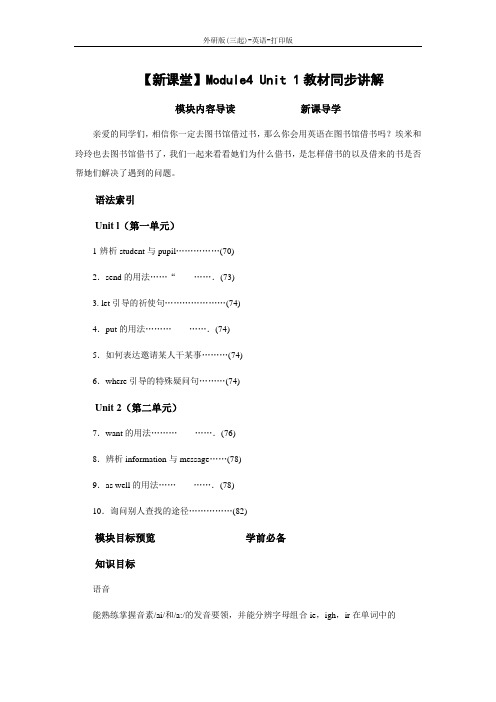
1. let's引起的祈使句。
2.特殊疑问句的用法。
3.倒装句的用法。
能力目标
1.了解如何在图书馆借书。
2.能够询问和寻找相关的信息。
文化目标
了解未来的图书馆。
Unit l:Let's make a home library.
(第一单元:让我们建一个家庭图书馆o)
(教材20~22页)
1.Look,listen and say.看一看,听一听,说一说。(教材第20页)
Lingling:OK.玲玲:好的。
Amy:What are these big books? They're埃米:这些大书是什么?它们很重。
Lingling: They're dictionaries. We can put them here
玲玲:它们是字典。我们可以把它们放在这里。
Amy: These are the library cards for the children
Sam:No, they aren't These books are about art
萨姆:木,它们不是。这些书是关于美术的。
Lingling:What? Oh, they're in the wrong place.
玲玲:什么?噢,它们在错误的地方。
Juhn:Where are the books about animals?关于动物的书在哪里?
A.book B.CDs C CD
3. There are many books in our new__________
·A. library B.book C.librarys
4.-Let's go to the park.
外研社四上英语Module4Unit1Doyouwantsomerice(朗读+知识点)
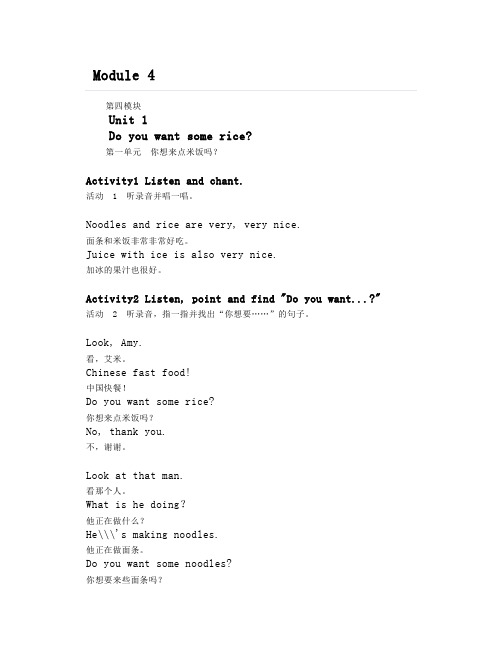
Module 4第四模块Unit 1Do you want some rice?第一单元你想来点米饭吗?Activity1 Listen and chant.活动 1 听录音并唱一唱。
Noodles and rice are very, very nice.面条和米饭非常非常好吃。
Juice with ice is also very nice.加冰的果汁也很好。
Activity2 Listen, point and find "Do you want...?"活动 2 听录音,指一指并找出“你想要……”的句子。
Look, Amy.看,艾米。
Chinese fast food!中国快餐!Do you want some rice?你想来点米饭吗?No, thank you.不,谢谢。
Look at that man.看那个人。
What is he doing?他正在做什么?He\\\'s making noodles.他正在做面条。
Do you want some noodles?你想要来些面条吗?Yes, please.好的,谢谢。
Here are noodles with tomato and egg, and noodles with meat and potato.这里有西红柿鸡蛋面和土豆肉面。
What do you want?你想要什么?Noodles with tomato and egg, please.西红柿鸡蛋面,谢谢。
Mm, it\\\'s nice!嗯,真好吃!Activity3 Listen and say.活动 3 听录音并开口说。
Do you want some noodles?你想要来些面条吗?Yes, please.好的,谢谢。
Do you want some milk?你想喝点牛奶吗?No, thank you.不了,谢谢。
Activity4 Practise.活动 4 练习Do you want some noodles?你想要来些面条吗?Yes, please.好的,谢谢。
牛津高中英语模块4知识点总结
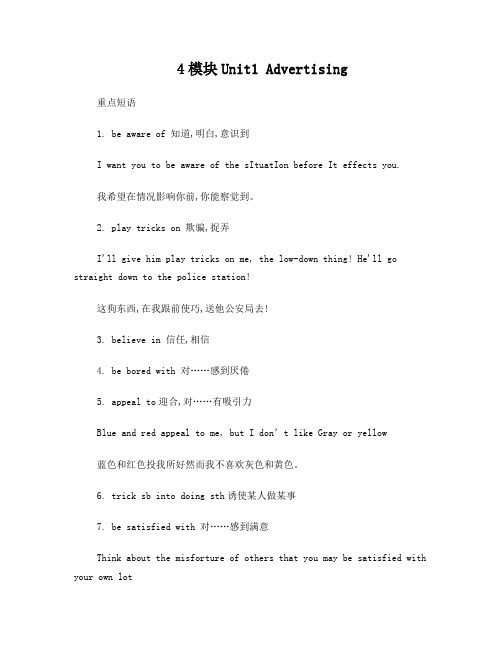
4模块Unit1 Advertising重点短语1. be aware of 知道,明白,意识到I want you to be aware of the sItuatIon before It effects you.我希望在情况影响你前,你能察觉到。
2. play tricks on 欺骗,捉弄I'll give him play tricks on me, the low-down thing! He'll go straight down to the police station!这狗东西,在我跟前使巧,送他公安局去!3. believe in 信任,相信4. be bored with 对……感到厌倦5. appeal to迎合,对……有吸引力Blue and red appeal to me, but I don’t like Gray or yellow蓝色和红色投我所好然而我不喜欢灰色和黄色。
6. trick sb into doing sth诱使某人做某事7. be satisfied with 对……感到满意Think about the misforture of others that you may be satisfied with your own lot想想别人的不幸,你可以对自己的命运感到满足8. be used to对……习以为常,习惯于There are a few verbs which fit into both groups and a hyphenmay be used to show the distinction还有一些动词适合于上述两种情况,可用连接号表示这种区别9. fall for 上……的当,受……骗I can't believe you would fall FOR that old trick.我不相信你会上那老把戏的当。
Module 4 Unit 1 外研版英语九年级上册知识点详解

外研版九(上)Module 4 Home alone知识点详解Uni t 1 I can look after myself, although it won’t be easy for me★(A2).【知识点再现】It’s leaving from Platform 2. 从2号站台出发。
【知识点1】be leaving在这是现在进行时表将来时意义。
在英语中,可以用现在进行时表将来的动词一般都是一些表示位置转移的动词,如come, leave, go, fly, move, start等。
用现在进行时表将来指的是近期的、按计划和安排要发生的动作。
如:Are they all coming tomorrow? 他们明天都来吗?Annie is coming for supper this evening. 今晚安妮要来吃晚餐。
★(A2).【知识点再现】So am I, but I can’t miss two weeks of school. 我也是(很遗憾),但是我不能两周不上课。
【知识点2】So am I意为“我也是”,so代替上文提到的情况。
“So+be动词/助动词/情态动词+主语”表示自己与前一个人的情况相同或同意前一个人的说法,意思是“某人(主语)也是如此”。
be动词/助动词/情态动词要与前面句子的谓语在形式、时态上保持一致,与本句主语在人称和数上保持一致。
如:He can swim, and so can I. 他会游泳,我也会。
Joe was a little upset, and so was I. 乔有点不开心,我也有点儿。
He has been ill, and so has his wife. 他一直生着病,他妻子也一样。
【辨析】“so+ be动词/助动词/情态动词+主语”与“so+主语+ be动词/助动词/情态动词”的用法辨析:①“so+be动词/助动词/情态动词+主语”表示前面所述肯定情况同样适用于后者,意为“某人(主语)也是如此”,前后两句的主语不是同一人。
六年级英语上册第四模块
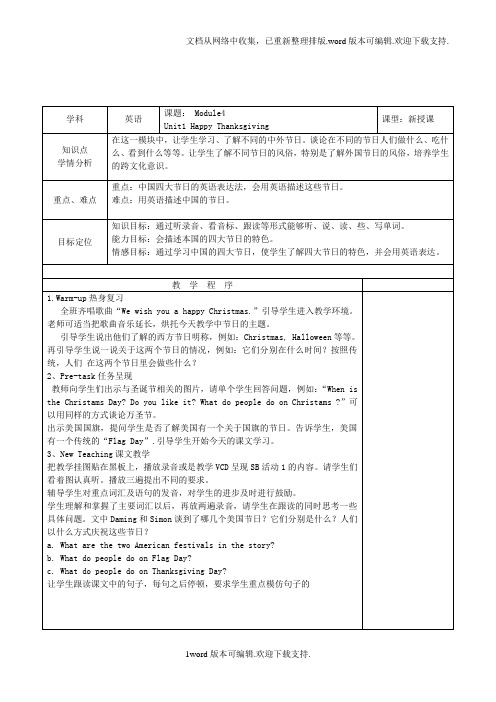
2、Pre-task任务呈现
教师向学生们出示与圣诞节相关的图片,请单个学生回答问题,例如:“When is the Christams Day? Do you like it? What do people do on Christams ?”可以用同样的方式谈论万圣节。
学习任务:
What’s your favourite festival?
My favourite festival is Lantern Festival.
重点、难点
重点:新授单词:festival,meal,specil,Thanksgiring
难点:能够比较熟练地运用人称代词,同时会用英语表述外国的几个大型节日。
目标定位
知识目标:a.学生通过听录音、看音标、跟读等形式,能够听、说、读、写。
b.学生能够比较熟练地运用人称代词。
能力目标:通过学习,能够比较熟练地运用人称代词,并会用英语表述外国的几个大型节日。
情感目标:通过谈论节日,增强自己的口语表达能力,并通过了解外国的节日,加强对本国的各方面的认识。
1.Warm-up
( )2.Canyou tellmemorewithit,Mary? A B C
( )3.WhatdoyourdoonChristmas Day?
A B C
课题: Module4
Unit2What’s your favourite festival?
知识点
学情分析
语言功能:
介绍中国的主要节日;比较中西方节日的差异;交流自己对节日的喜好。
外研版(三起)-英语-六年级下册--外研版三起Module 4 Unit 1教材同步讲解
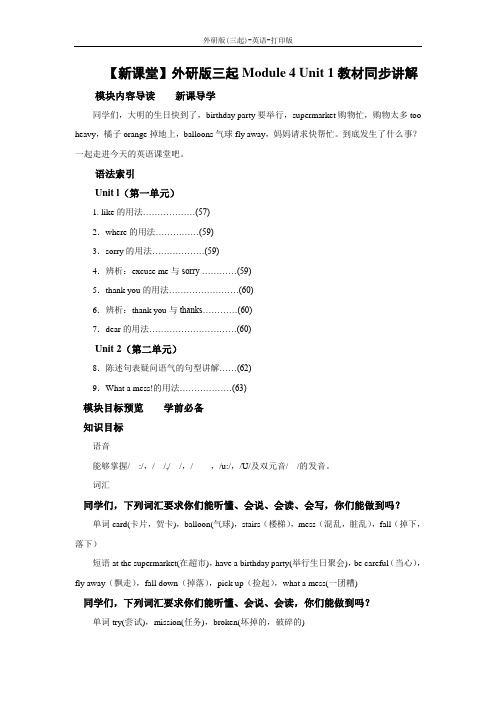
【新课堂】外研版三起Module 4 Unit 1教材同步讲解模块内容导读新课导学同学们,大明的生日快到了,birthday party要举行,supermarket购物忙,购物太多too heavy,橘子orange掉地上,balloons气球fly away,妈妈请求快帮忙。
到底发生了什么事?一起走进今天的英语课堂吧。
语法索引Unit l(第一单元)1. like的用法 (57)2.where的用法 (59)3.sorry的用法 (59)4.辨析:excuse me与sorry (59)5.thank you的用法 (60)6.辨析:thank you与thanks (60)7.dear的用法 (60)Unit 2(第二单元)8.陈述句表疑问语气的句型讲解 (62)9.What a mess!的用法 (63)模块目标预览学前必备知识目标语音能够掌握/:/,//,//,/,/u:/,/U/及双元音//的发音。
词汇同学们,下列词汇要求你们能听懂、会说、会读、会写,你们能做到吗?单词card(卡片,贺卡),balloon(气球),stairs(楼梯),mess(混乱,脏乱),fall(掉下,落下)短语at the supermarket(在超市),have a birthday party(举行生日聚会),be careful(当心),fly away(飘走),fall down(掉落),pick up(捡起),what a mess(一团糟)同学们,下列词汇要求你们能听懂、会说、会读,你们能做到吗?单词try(尝试),mission(任务),broken(坏掉的,破碎的)短语get on the bus(上车),get off the bus(下车),drive the bus(开公共汽车),not at all(没关系),put…on…(把……放在……上),write... on...(在……上面写……)句型同学们,下列句型要求你们能听懂、会说、会读、会写,你们能做到吗?1.含有情态动词can的句型:Who can help me?谁能帮我?I can help you.我能帮你。
外研版(三起)五年级下册英语第四模块第一单元课件-Module 4 Unit 1Let’s make a home library
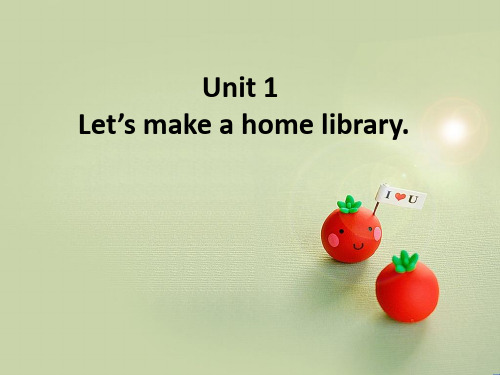
Listen and say
Let’s make a home library!
That’s a good idea.
These are all books about
science.
Let’s put them on this
shelf.
Practise
Here’s a book about
Here you are. Let's put them with the CDs.
They are dictionaries. We can put them here.
Great! Now we can ask them to come.
What are these big books? They are heavy.
CDs.
Lingling: OK.
和…一起
邀请…做…
Amy: What are these big books? They’re heavy.
Lingling: They’re dictionaries. We can put them here.
Amy: These are the library cards for our friends.
student is important. • 做一名好学生是很
重要的。
sent 寄送;send的过去式
• eg: I sent these books to my friends.
• 我寄了这些书给我 的朋友们。
• eg: Who sent you these?
• 这些是谁寄给你的?
idea 主意
Unit 1 Let’s make a home library.
外研版九年级英语上册Module 4 Unit 1知识点

Module 4 Home aloneUnit 1 I can look after myself, although it won’t be easy for me.1.It’s leaving from platform2. 火车将要从2号站台离开(发车)。
Your train is about to leave. 您乘坐的火车马上就要开了。
(教材第26页)我们都知道一般将来时的两种基本结构:will+do和be going to do。
本课出现了另外两种表示将来时的特殊结构:be+doing 现在进行时表将来此类用法要用于表示位置移动的动词,如come, go, leave, move, drive, fly, start, arrive等。
✧I’m flying to Shanghai tomorrow. 我明天要飞往上海。
✧He’s leaving for Shenzhen the day after tomorrow.他后天动身去深圳。
be about to do sth正要做某事此句型通常表示动作马上要发生,在时间上指最近的将来,故不能再加tomorrow, next week等表将来的时间状语。
常与when连用be about to do sth when…“正要做什么事情突然间……”。
✧I was about to leave when the phone rang. 我正要离开,手机突然响了。
✧We should always believe that something wonderful is about to happen.我们应该永远相信美好的事情就要发生。
(2021·全国·单元测试)My father ______ Beijing next week.A. leave forB. leaves forC. is leaving forD. left for2.So am I, but I can’t miss two weeks of school.我也是(很遗憾),但是我不能缺席两周的学校课程。
外研版(三起)-英语-三年级下册--模块4 Unit 1 同步讲解教案
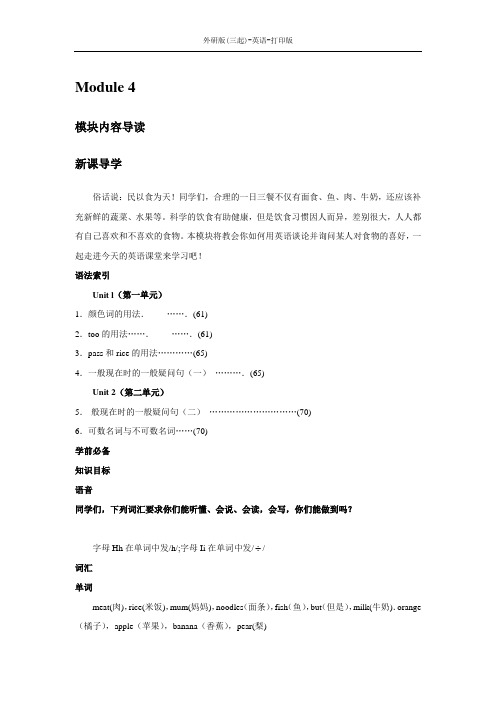
Module 4模块内容导读新课导学俗话说:民以食为天!同学们,合理的一日三餐不仅有面食、鱼、肉、牛奶,还应该补充新鲜的蔬菜、水果等。
科学的饮食有助健康,但是饮食习惯因人而异,差别很大,人人都有自己喜欢和不喜欢的食物。
本模块将教会你如何用英语谈论并询问某人对食物的喜好,一起走进今天的英语课堂来学习吧!语法索引Unit l(第一单元)1.颜色词的用法.…….(61)2.too的用法…….…….(61)3.pass和rice的用法 (65)4.一般现在时的一般疑问句(一)……….(65)Unit 2(第二单元)5.-般现在时的一般疑问句(二) (70)6.可数名词与不可数名词 (70)学前必备知识目标语音同学们,下列词汇要求你们能听懂、会说、会读,会写,你们能做到吗?字母Hh在单词中发/h/;字母Ii在单词中发/ /词汇单词meat(肉),rice(米饭),mum(妈妈),noodles(面条),fish(鱼),but(但是),milk(牛奶).orange (橘子),apple(苹果),banana(香蕉),pear(梨)短语pass me the rice(递给我米饭) here you are(给你)同学们,下列词汇要求你们能听懂、会说、会读,你们能做到吗?单词nice(美好的),ginger(生姜),spice(调料),does(做),doesn't(不),don't(不),pass(传递) 短语very nice(很好),not very nice(不是很好)句型同学们,下列句型要求你们能听懂、会说、会读,会写,你们能做到吗?1.询问对方是否喜欢某物的一般疑问句及肯定、否定回答。
-Do you like…?你喜欢……吗?-Yes,I do.是的,我喜欢。
/No,I don't.不,我不喜欢。
2.询问他人是否喜欢某物的一般疑问句及肯定、否定回答。
-Does+某人+1ike…?某人喜欢……吗?-Yes,he/she does.是的,他/她喜欢。
- 1、下载文档前请自行甄别文档内容的完整性,平台不提供额外的编辑、内容补充、找答案等附加服务。
- 2、"仅部分预览"的文档,不可在线预览部分如存在完整性等问题,可反馈申请退款(可完整预览的文档不适用该条件!)。
- 3、如文档侵犯您的权益,请联系客服反馈,我们会尽快为您处理(人工客服工作时间:9:00-18:30)。
Unit1 Women of achievement Language Points1. achievement n.成就;功绩(P1)①Seeing the lines of trees,we all had a sense of achievement.看着一排排的树木,我们都有一种成就感。
②The achievement of one’s purpose depends largely upon one’s effort.实现自己的目标主要靠自己的努力。
③The first walk on the moon was quite an achievement.第一次在月球上行走是一项了不起的成就。
④She hoped to achieve her ambition to become a singer.她希望实现当歌手的抱负。
[归纳拓展]quite an achievement了不起的成就sense of achievement成就感achieve v.完成;达到(目标);取得胜利achieve one’s purpose /aim /goal达到某人的目的achieve success/a good result获得成功/ 得到好的结果2. put...to death处死(P1)①Iraq’s former President Saddam Hussein was put to death in 2006.伊拉克前总统萨达姆·侯赛因于2006年被处死。
②Yao Jiaxin was sentenced to death on Friday.药家鑫在周五被判处死刑。
③Ten people were burned to death in the hotel fire.旅馆火灾中有10人被烧死。
[归纳拓展]sentence sb.to death判处某人死刑beat sb.to death打死某人freeze to death冻死burn to death被烧死bleed / burn / starve to death流血而死/烧死/饿死frighten / scare sb.to death把某人吓得要死3. condition n.状况,状态;条件,环境,情况(常用复数)(P1)①To our relief,the girl who was injured in the China high-speed rail crash is in good condition now.令我们欣慰的是,在高铁碰撞中受伤的女孩如今状况良好。
②I agreed to the conditions of the contract.我同意这项合同的条件。
③The experiment must be done under laboratory conditions.这项试验必须在实验室环境下进行。
④He is overweight and out of condition.他体重超重,健康状况不佳。
⑤You must on no condition tell them what happened.=On no condition must you tell them what happened.你绝不能告诉他们所发生的事。
[归纳拓展]in bad /good /excellent condition处于糟糕的/良好的/极佳的状态out of condition健康状况不佳on(the)condition that在……条件下,假如on no condition决不4.behave vi.& vt.(P2)(1)(举止或行为)表现①I’m sorry about last night—I behaved like a child.对不起,昨天晚上我表现得太幼稚了。
②They behaved badly towards/to the foreigners.他们对外国人很不礼貌。
③The little girl behaved with great courage in the face of the gunman. 在持枪歹徒面前这个小女孩表现得极有勇气。
(2)举止得体;守规矩;检点④You should behave yourself in public.在公共场合你应该守规矩。
⑤The headmaster doesn’t allow bad behaviour in class.校长不允许班上有不良行为。
[归纳拓展]behave oneself守规矩;举止适当(得体)well-behaved adj.表现好的badly-behaved adj.表现差的behaviour n.[U] 举止;行为be on one’s best behaviour 举止规矩5.shade(P2)(1)n.[U]荫;阴凉处①Chimps are fond of eating bananas in the shade. 黑猩猩喜欢在阴凉处吃香蕉。
②I saw them playing cards in the shade of a tree. 我看见他们在树荫下打牌。
[归纳拓展]in the shade在阴凉处under/ in the shade of a tree在树荫下(2)vt.遮蔽,挡光③She shaded her eyes against the sun.她遮住眼睛避免阳光直射。
④His impatience shaded into anger.他由不耐烦逐渐变成了愤怒。
[归纳拓展]shade...from / against...使……免受……的照射shade into渐渐与……分辨不清,逐渐变成6. worthwhile adj.值得的,“值得做某事”常用It is worthwhile doing /to do sth.结构。
(P2)①It is worthwhile practising oral English every morning.每天早晨练习英语口语是很值得的。
②It’s worthwhile taking the trouble to explain a job fully to new employees.给新雇员详细解释一下工作(要求),费点事是值得的。
③The smile on her face made it all worthwhile.她脸上的笑容使这一切都非常值得。
④I’d like the money to go to a worthwhile cause.我很想把钱花在有价值的事业上。
温馨提示:(1)worth只能作表语,在be worth doing中,只能用主动形式表示被动,worth前往往用well作修饰语,而不用very。
(2)worthy除了作表语,表示“值得……”,也可用作定语,表示“值得尊敬的;值得注意的”。
(3)表示“很值得……”要用well worth /worthy/ worthwhile...。
7.observe vt.(P2)(1)观察;观测;监视①I felt he was observing everything I did.我觉得他正在监视着我做每一件事情。
(2)看到;注意到②I observed a stranger go/going into the office.我看到一个陌生人进了/正在进入办公室。
③I observed that several students were asleep in class.我注意到有几个学生在课堂上睡着了。
(3)遵守(规则、法律等)④Everyone should observe the traffic rules.人人都应该遵守交通规则。
(4)庆祝;欢度⑤Do they observe Christmas?他们过不过圣诞节?[归纳拓展]Observe sb doing sth 观察某人在做某事Observe sb do sth 观察到某人做了某事Observe that 观察到温馨提示:下列动词后的不定式在主动语态中省略to;在被动语态中不能省略to。
一感:feel二听:hear,listen to三让:make,let,have四看:see,watch,observe,notice半帮助:help巧记“看”口诀看场电影要用see,读书看报用read;电视、戏剧和比赛,凡是表演用watch;observe细观察,一时注意notice。
8. respect(P2)(1)vt.尊敬,敬重①We deeply respect his courage.(=We deeply respect him for his courage.)我们深深敬佩他的勇气。
②We work well together,and I respect him as a colleague.(2)n.尊敬;尊重;敬意;方面③He often helps the disabled;he should gain everybody’s respect.他时常帮助残疾人,理应获得大家的尊敬。
④I can’t agree with you in this respect.在这方面我不赞同你的意见。
[归纳拓展]respect sb./sth.for...因……尊重某人/ 某物respect oneself自重respect sb.as...尊重(敬)某人为……我们在一起工作得很愉快,而且作为同事我很敬佩他。
[归纳拓展]gain / lose sb.’s respect赢得/失去某人的尊重/ 尊敬earn / win respect受到尊敬show / have respect for sb.尊重/ 尊敬某人in all respects在各个方面give / send one’s respect to sb.代某人问候某人[归纳拓展]“代某人向某人问好”的多种表达法归纳如下:remember sb.to sb.send sb.’s best w ishes to sb.give one’s regards to sb.send sb.’s kind wishes to sb.give sb.’s respects to sb.9.argue v.(P2)(1)to give a different idea 争论,辩论①He has been arguing with Mary about the plan for a long time. 他和玛丽就这项计划争论了好长时间。
